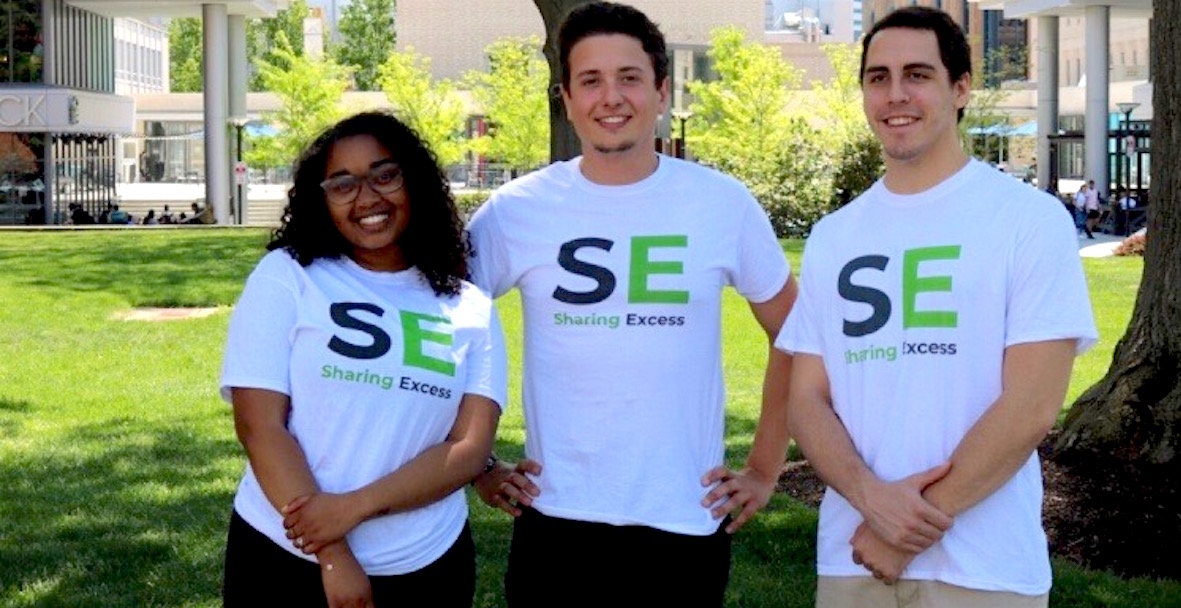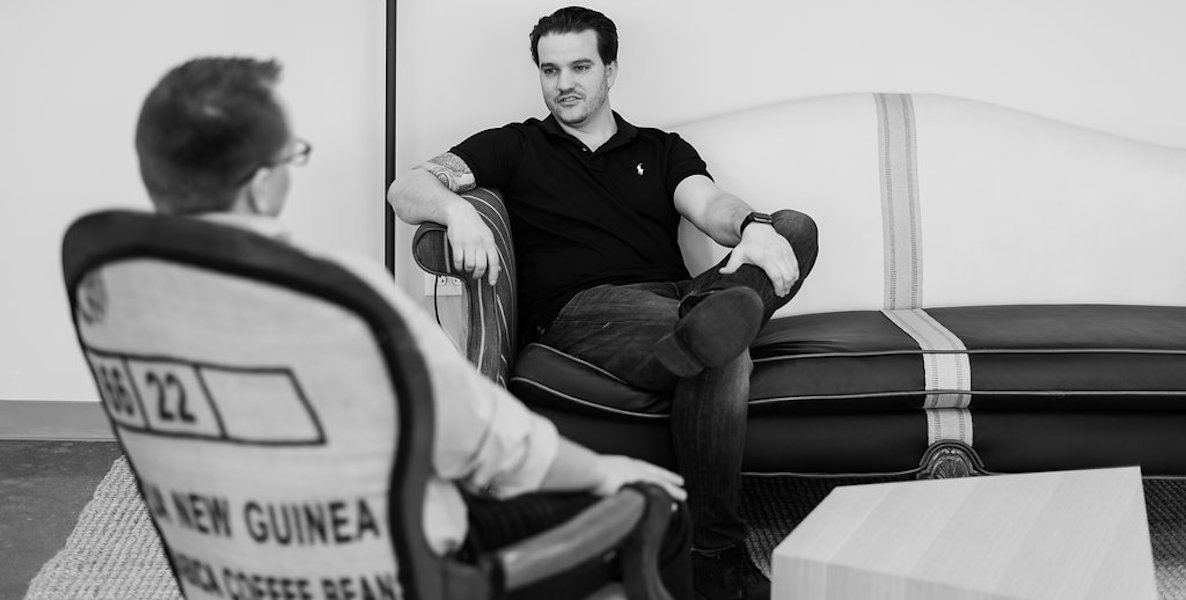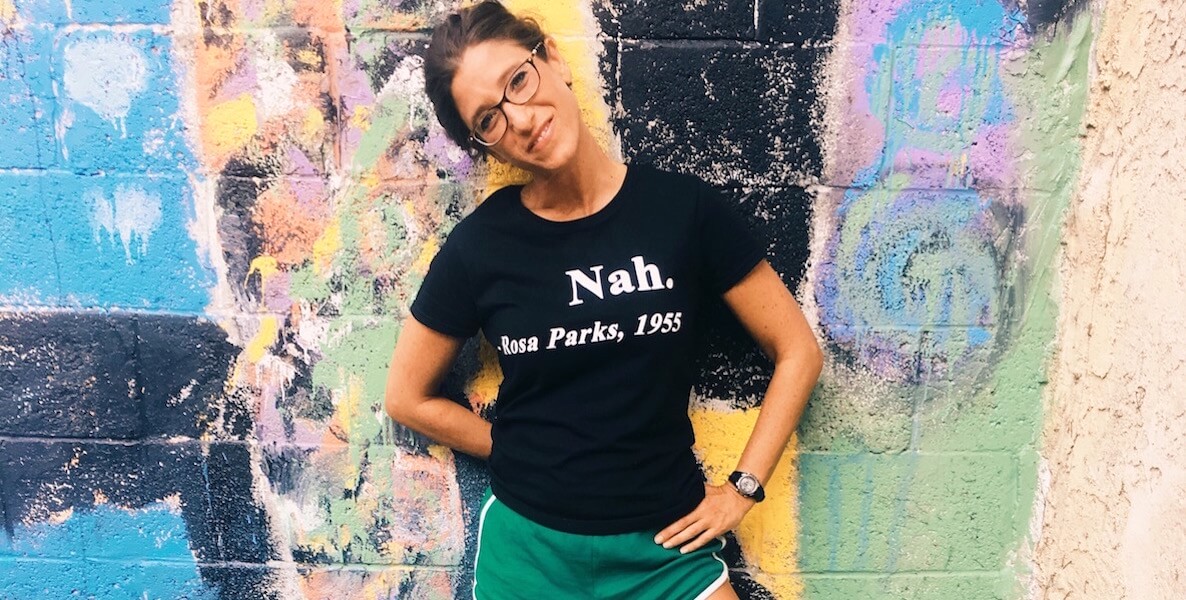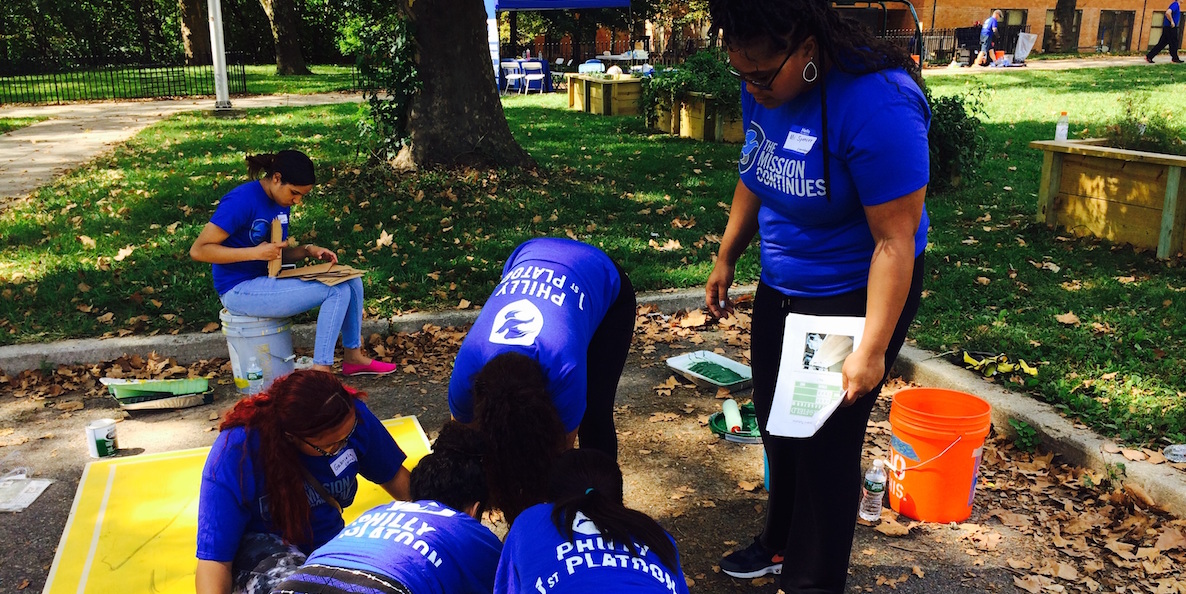Anthony Fedele, now 43, served in the military for six years before he returned home to Philadelphia in 1999 a changed man.
Memories from an accident he won’t even talk about triggered panic attacks. He viewed everyone as either friend or enemy––mostly enemies––and all but restricted himself from talking with or being around other veterans. He no longer found jokes funny and could not understand things that people were trying to explain to him. He’d always been smart, and a voracious reader, but he lost the ability to extract context from what he was reading. Something was clearly wrong.
He was diagnosed with PTSD, and then traumatic brain injury, and started taking nearly 30 pills a day. One morning, after a particular night of turmoil, Fedele visited the Veteran Affairs hospital, left on his motorcycle later and quickly found himself reaching speeds of 90 miles an hour on I-76. He prayed for the strength to pull his bike into the wall to his left. But he couldn’t.
“I saw reality for what it was that day,” says Fedele. “I knew, in that exact moment, that I had to do something differently.”
“The idea that you are not working just to promote yourself, the idea that it is mission oriented, knowing that the work that I am doing and all this time that I am putting in, makes an actual impact—now that’s something I can take home with me,” says Fedele.
What Fedele did was what he had done all those many years ago: Join up. This time, it was with The Mission Continues, a national nonprofit that empowers veterans adjusting to civilian life through community impact, leading service projects, alongside community members and volunteers, to solve the problems that have gripped disenfranchised communities for too long.
Fedele, an MBA student at Drexel University, is now the Philadelphia Platoon Leader of The Mission Continues, which has about 40,000 members in over 40 communities across the country, tackling what its executive director Mohan Sivaloganthan calls “a unique juxtaposition of challenges.”
“You’ve got disenfranchised communities suffering from broken education systems, healthcare systems, just so many different ways that inequalities are holding children down and holding families down,” says Sivaloganthan. “Then, on another side, you’ve got veterans who have this immense base of capability that’s been developed through their time in the military: A sense of purpose, a sense of wanting to give back, project management skills, discipline, teamwork, comradery––these are skills that we need in these communities we are talking about.”
The Mission Continues opened its Philly chapter in 2014, and now has about 275 local veterans as well as other volunteers. Fedele, himself a volunteer, brings those troops together for several events a year, usually in schools. Most notable is the work they’ve done over the last two years in Kensington’s Thomas Alva Edison High School—coincidentally the high school that lost more students to the Vietnam War than any other in America.
“It is time,” Fedele says, “to change the narrative of what it means to be a veteran.”
In the fall of 2016, Fedele visited the school and asked Principal Awilda Ortiz, “What is your wish list?” At first, he says, she was quite reserved, having learned not to rely on the promises of non-profits dropping in for a day or a week to do their community service and move on. But almost two years later, that list is near complete, three years ahead of its expected schedule.
The Mission Continues built a new softball field with a scoreboard, where there was once only grass and painted lines. They re-painted silver goal posts that previously could not be seen in direct sunlight. They painted the 900-foot fence and the window bars that, while unpainted, made the school look too much like a prison. They built a vegetable garden and an outdoor classroom, among a myriad of other tasks. And in September, as a final project at the high school, Fedele has organized a group of 400 to 500 volunteers to renovate the auditorium and build basketball courts.
![]()
“I think the nonprofit world is just right for veterans,” says Fedele. “The idea that you are not working just to promote yourself, the idea that it is mission oriented, knowing that the work that I am doing and all this time that I am putting in, makes an actual impact. I get to see that the schools are actually using the planters that we build, or the picture of the principal with a handful of vegetables in her hand––grown from what we built. Now that’s something I can take home with me.”
The Mission Continues was founded in St. Louis in 2007, at first for post-9/11 veterans. (Its founder, former Missouri Gov. Eric Greitens, was later accused of using the group’s donor list to raise money for his gubernatorial campaign—which the current leadership denies—as well as of several illegal acts, including sexual assault and blackmail.) From three vets that first year, the group grew steadily over the last decade, and now works with more than 900 community and civic groups on volunteer activities—including in recovery efforts, like those after last year’s Hurricane Harvey.
A Veterans Administration report estimated that in 2016 the work of The Mission Continues amounted to $4.7 million in value to communities around the country. A couple of studies also have found that the rate of depression among volunteers went down by half, and that vets involved showed vast improvements in their physical, mental and social health.
A Veterans Administration report estimated that in 2016 the work of The Mission Continues amounted to $4.7 million in value to communities around the country. A couple of studies also have found that the rate of depression among volunteers went down by half, and that vets involved showed vast improvements in their physical, mental and social health.
Fedele’s struggle to find his place among the civilian world is not unique. According to Leah Blain, director of the Steven A. Cohen Military Family Clinic at the University of Pennsylvania, as much as 40 percent of veterans experiencing some sort of behavioral health concerns, like depression, anxiety or PTSD, are not seeking treatment.
“The last thing you want to do is pick up that 500 pound phone and ask for help,” says Fedele. “But you can’t be afraid to ask for help. That’s the most important thing. Everyone knows they should, but nobody does.”
For Fedele, the help he found from The Mission Continues came unexpectedly. He had already been practicing with a zen Buddhist monk, and was beginning to “undo a lot of the conditioning” he had gone through. But there was still something missing––that comradery, that sense of purpose, that mission.
![]()
He had struck up a conversation with the brother of his neighbor, a veteran who was visiting Philadelphia, and was a volunteer with The Mission Continues. After listening to the experiences he shared, Fedele was sold, and signed up that day. His first experience with the group was in Detroit in June of 2016 at a “Mass Deployment,” and annual event where some 100 veterans and volunteers from across the country gather in one city for several days of service work.
“Think about the ability to identify an issue happening somewhere; develop a strategy; rally people together to deal with it; being wheels up and on the ground within 18 hours,” says Sivaloganthan. “Now ask yourself: who does that better than the military, than veterans?”
For Fedele, it was the first time in nearly 10 years that he had allowed himself to be among other veterans, and he didn’t know what to expect. Fedele, alongside more than 70 veterans and volunteers, tackled a number of projects across the city, from construction and landscape, to painting and public art. And despite the scorching summer temperatures and exhausting manual labor, Fedele had never felt better and more at home. Here was a mission, a purpose; and here, surrounding him, were people who understood him.
Fedele says that a friend, also a veteran, said it best: “Us veterans,” she once told him, “we need to be around each other to remind us what we are capable of.”
“That is exactly 100 percent true,” Fedele adds. “I forgot. I forgot what I was capable of.”
![]()
Now Fedele brings that same motivation to Philadelphia, as he did last month, when he led about 30 vets and their families in a Saturday morning painting session at Robert E. Lamberton school in Upper Darby. As with all their events, the day started with a rousing shout that resonated through the school: Charlie Mike!
The phrase is a military command that means to get the job done, finish a task in pursuit of a larger mission, something often said in the heat of the moment to remind military men and women of who they are, and why they are wherever they may be. It is a fitting motto for The Mission Continues, and for what Fedele hopes is the ultimate outcome for the veterans: Being a guiding light for a country that needs it.
“It is time,” Fedele says, “to change the narrative of what it means to be a veteran.”
Photo: The Mission Continues






